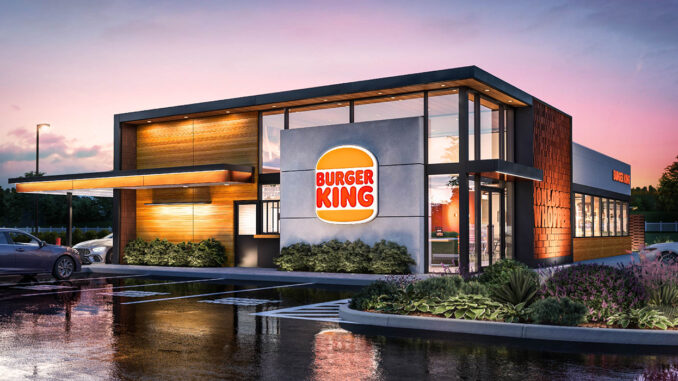
By Lea Mira, RTN staff writer - 2.14.2025
Restaurant Brands International (RBI), the parent company of Burger King, is continuing its efforts to modernize the brand and improve franchisee profitability through a strategic investment plan. As part of this initiative, the company is focusing on remodeling, restaurant technology, and enhancing speed of service, particularly at its Tim Hortons brand.
RBI CEO Josh Kobza reaffirmed the company’s commitment to modernizing the Burger King system during a call with analysts after releasing the fourth-quarter earnings report. In 2024, RBI completed 370 restaurant remodels, including 60 Carrols-owned locations, bringing the total percentage of modernized Burger King restaurants to 51%. The company aims to reach over 85% modernized locations by 2028. Early results from 220 remodeled restaurants that have been open for more than six months show an average mid-teens year-one sales increase and improved franchisee profitability.
A big part of this modernization effort is centered around the deployment of cutting-edge technology to enhance customer experience and operational efficiency. The company is rolling out digital menu boards across its locations, providing dynamic pricing and personalized promotions based on customer preferences and time of day. Additionally, RBI is integrating AI-powered analytics to optimize drive-thru operations, reducing wait times and improving order accuracy.
The modernization plan is part of Burger King’s broader “Reclaim the Flame” initiative, first introduced in 2022. The plan involves an investment of up to $700 million through the end of 2028, with funding allocated to advertising and digital improvements under “Fuel the Flame” and remodeling, technology upgrades, and infrastructure improvements under “Royal Reset.” While the Fuel the Flame investments were completed in the fourth quarter of 2024, RBI has thus far funded $133 million out of a planned $550 million for Royal Reset improvements.
As part of its technological advancements, Burger King has also introduced self-service kiosks in many of its modernized locations. These kiosks provide customers with a streamlined ordering experience, allowing for upselling opportunities and reducing dependence on front-line staff during peak hours. Furthermore, the company has enhanced its mobile app with AI-driven recommendation engines, ensuring customers receive tailored deals based on their purchasing history and location.
The company has also introduced 80 new Sizzle prototype Burger King locations, which Kobza believes will enhance customer experiences and inspire franchisees. These next-generation stores are designed to improve efficiency, service speed, and restaurant aesthetics to drive customer engagement and sales growth. They also incorporate smart kitchen equipment that automates food preparation and inventory management, reducing waste and improving consistency.
In addition to its investments in Burger King, RBI is working to enhance operational efficiency at Tim Hortons by focusing on speed of service. With some locations achieving drive-thru service times of just 28 seconds per car, the brand has positioned itself as one of the fastest drive-thru concepts in North America. According to Kobza, every one-second reduction in drive-thru time translates to approximately $30,000 in additional annual sales per restaurant. This focus on operational efficiency aims to boost customer satisfaction, throughput, and overall revenue.
RBI’s commitment to expansion and modernization is further demonstrated through its recent acquisitions. The company completed the acquisition of Carrols Restaurant Group, its largest Burger King franchisee, in May 2024. A month later, it acquired PLK China, leading to the establishment of a new operating and reporting segment called Restaurant Holdings. This segment consolidates results from the newly acquired Carrols Burger King restaurants and PLK China locations, streamlining RBI’s operational structure.
To further advance its digital transformation, RBI is integrating cloud-based restaurant management software to centralize operations, from supply chain logistics to workforce scheduling. The adoption of AI-powered demand forecasting tools allows restaurant managers to predict peak hours and adjust staffing levels accordingly, reducing labor costs while maintaining optimal service levels.
The company’s financial performance reflects steady growth. For the fourth quarter ended December 31, 2024, RBI reported net income of $361 million, or 79 cents per share, compared to $736 million, or $1.60 per share, in the prior year. Revenues for the quarter reached $2.296 billion, up from $1.82 billion in the same period a year earlier. Global same-store sales increased by 2.5%, with Tim Hortons U.S. up 2.2%, Burger King U.S. up 1.5%, Popeyes U.S. up 0.1%, and Firehouse Subs remaining flat. International units, comprising 15,639 restaurants, saw a 4.7% increase in same-store sales.
With more than 30,000 restaurants across 120 countries and territories, RBI’s portfolio includes Tim Hortons, Burger King, Popeyes Louisiana Kitchen, and Firehouse Subs. The company’s continued investments in modernization, digital transformation, and operational efficiency reflect its long-term strategy to strengthen its competitive position in the global quick-service restaurant market.
As RBI progresses with its modernization plans, the industry will be watching closely to see how these strategic investments impact customer experience, franchisee profitability, and overall brand performance. With ambitious goals set for 2028, the company remains focused on reinforcing Burger King’s standing as a leading quick-service brand while optimizing efficiency and growth opportunities across its restaurant portfolio.

